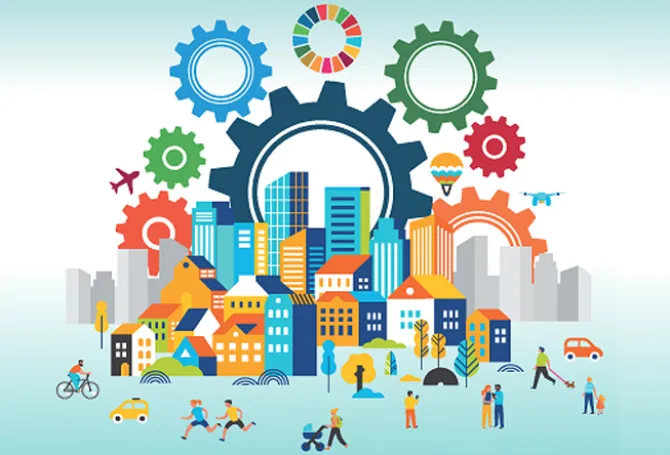
At the SDG Summit held on 18-19 September in New York, countries across the world came together to carry out a review of the progress on the Sustainable Development Goals (SDGs) and discussed potential pathways to achieve change. The 2023 Summit also marks the halfway point to the deadline set for achieving the 2030 Agenda and the SDGs.
The stocktaking, monitoring, and evaluation exercises executed by forums such as the recent SDG Summit, which put a large share of responsibility on developing nations, are deeply flawed.
Despite the rhetoric of universality, the outlined SDGs put the onus on developing countries to improve their environment and social indicators and gloss over the responsibility of wealthy nations which historically consumed a large share of global resources. Even to this day, the per capita consumption of a handful of wealthy countries in the Organisation for Economic Co-operation and Development (OECD) and the European Union (EU) is far higher than that of developing countries, and their CO2 emissions, e-waste, and overall consumption patterns have a severe and widespread impact on global environments. In this regard, the stocktaking, monitoring, and evaluation exercises executed by forums such as the recent SDG Summit, which put a large share of responsibility on developing nations, are deeply flawed. The global institutions that propagate such evaluation exercises apply normative pressure on developing nations through ranking, performance-based classifications and adherence to global standards. This normative pressure has not been backed by financial support as the contribution of OECD nations to Overseas Development Aid (ODA) is fast declining. In fact, between 2018-2022, the OECD’s Development Assistance Committee (DAC) member countries have contributed only 0.31 percent to 0.36 percent of their gross national income (GNI) to ODA. This is significantly lower than the 1 percent of GNI target set for international concessional public finance by all high-income and OECD DAC countries under SDG 17 (Global partnership for sustainable development).
The global institutions that propagate such evaluation exercises apply normative pressure on developing nations through ranking, performance-based classifications and adherence to global standards.
‘Sustainable Consumption Goals (SCG)’ could provide a complementary approach to achieving global sustainability. SDG 12 on Responsible Consumption and Production does not even begin to scratch the surface and extent of the problem. SCGs would be a set of targets for individual countries to reduce their per capita consumption through various interventions. These targets will need to be measured using globally negotiated indicators that are specific and time-bound, along with transparent monitoring systems to measure progress on their commitments. A SCG summit along the lines of the SDG Summit at the United Nations General Assembly (UNGA) can provide a vision and direction to create a sustainable world. It is important to note that OECD countries, which continue to absorb a large share of global resources, carbon budget and finite ecosystem services, should take proactive steps in adopting SCGs. Emerging nations, especially expert institutions from these countries, could set the standards and goals and convene regular stocktaking and performance assessments. India’s Mission LiFE (Lifestyle for Environment) is well-positioned to champion this idea of Sustainable Consumption Goals (SCG) at the global scale. At the recent G20 Summit in New Delhi, several world leaders acknowledged the importance of the Mission LiFE programme, which can significantly impact environmental and climate crises. Unsustainable consumption leads to more waste, more emissions, and more deforestation, among other environmental impacts. Calling for a lifestyle change and thereby, reducing consumption from the citizens of G20 member states- which account for nearly 60 percent of the global population—could make a big difference in the fight against climate change.
Outlining SCGs
SCGs can be initially aligned with seven themes listed under Mission LiFE, i.e., save water, save energy, reduce waste, reduce e-waste, reduce single-use plastics, adopt sustainable food systems, and adopt healthy lifestyles.
A SCG summit along the lines of the SDG Summit at the United Nations General Assembly (UNGA) can provide a vision and direction to create a sustainable world.
The success of SCGs would depend on the active participation of the OECD. For instance, OECD countries are among the world’s largest economies and consumers, and their active involvement will ensure the success of the SCGs. By adopting SCGs, these nations have the power to set a global standard. Unsustainable consumption patterns can lead to resource scarcity, which in turn can result in higher commodity prices and economic instability. By promoting sustainable consumption, countries can help ensure long-term financial stability, both domestically and internationally. With strong lead and influence from India through the LiFE Mission, SCGs fairly represent the interests of developing nations at a global scale. By adopting sustainable consumption goals, OECD countries send a strong signal of solidarity to developing nations and portray their commitment to an equitable world. This will also shape our action against climate change, where countries with a higher share of global emissions contribute somewhat towards climate action.
Unsustainable consumption patterns can lead to resource scarcity, which in turn can result in higher commodity prices and economic instability.
There are seven critical themes underpinning SCGs for OECD countries:
- Water conservation: SDGs call for universal and equitable access to safe and affordable drinking water for all by 2030. This includes the wide-scale adoption of integrated water management activities at a wider landscape level. However, setting definitive targets to achieve water conservation goals could accelerate progress faster in this area. A measurable indicator here could be the volume of freshwater withdrawals. In aggregate terms, of the 3.9 trillion cubic metres of annual freshwater withdrawal worldwide, the OECD countries alone withdrew more than 1 trillion cubic metres of freshwater in 2020, while the least developed countries consumed only as much as 2 trillion in the same year. A reduction of freshwater withdrawals through improved efficiency in agriculture, industry, and domestic use can be set as a target.
- Energy conservation: A strong push towards energy-efficient practices at the household level through behavioural changes can significantly reduce energy consumption. This can be measured and monitored through per capita energy consumption. For high-income countries such as the OECD, the per capita energy consumption has consistently increased from 1965 to 2022. In 2022, these countries’ per capita energy consumption was 2.5 times the global average and almost 46 times that of the average consumption in low-income countries. SCGs can call for increase in energy efficiency in buildings, transport, and industries by coupled with an indicator for reduction in overall consumption of energy.
- Waste reduction: It is estimated that nearly one-third of the food produced in the world goes to waste, which contributes heavily towards greenhouse gas emissions. This can be reduced through efficient recycling, composting and other waste-reduction initiatives. Municipal waste generation, comprising 10 per cent of total waste generation, has seen a significant rise in the OECD countries. An average person in the OECD countries generated as much as 520 kg of annual municipal waste in 2015. The numbers have likely still gone up. Encouraging segregation at the source and promoting home composting could provide an efficient solution. SCG should target reduction of municipal solid waste by 2030.
- Reducing e-waste: Increasing e-waste levels in urban areas and a lack of disposal/processing systems have recently become a significant challenge. As a result, most of the e-waste is in landfills and poses substantial environmental and public health challenges. The OECD countries were some of the world’s worst e-waste offenders in 2016, contributing as much as 20 to 30 kg of per capita e-waste. SCG can set a targets to ensure that digital devices sold by 2030 are designed for extended life cycles, repairability and recyclability. A measurable indicator here is the percentage of digital devices that are built-in with eco-design features.
- Reducing single-use plastics: Single-use plastics often end up as deadly waste in landfills and the ocean and pose a substantial threat to wildlife. Although several attempts to curb them exist currently, there is still a long way to go until we see a drastic reduction. SCGs should aim to drastically reduce single-use plastic by 2030. This can be measured by the weight/volume of single-use plastic consumed per capita.
- Adopt sustainable food systems: World over, there is a strong awareness towards sustainable agricultural practices. However, these practices need substantial investments to be scaled up. SCGs can aim for a target to ensure that food is produced sustainably by 2030. A reliable measure here is the percentage of food certified under sustainable agricultural practices or aquaculture standards.
- Adopt healthy lifestyles: Healthy lifestyles, such as sustainable mobility, must be promoted in urban areas. A measurable indicator here could be that individuals predominantly use public transport, walking or cycling by 2030.
Expert institutions led by developing nations can take the lead in achieving these goals. These goals also need commitment at all levels—from policymakers to businesses, communities, and individuals. It is not just the reduced environmental footprint for OECD countries that determines the success of these goals, but also a potential economic advantage as sustainable practices can drive innovation, job creation, and long-term stability for all.
Vikrom Mathur is Senior Fellow at the Observer Research Foundation
The views expressed above belong to the author(s). ORF research and analyses now available on Telegram! Click here to access our curated content — blogs, longforms and interviews.




 PREV
PREV


